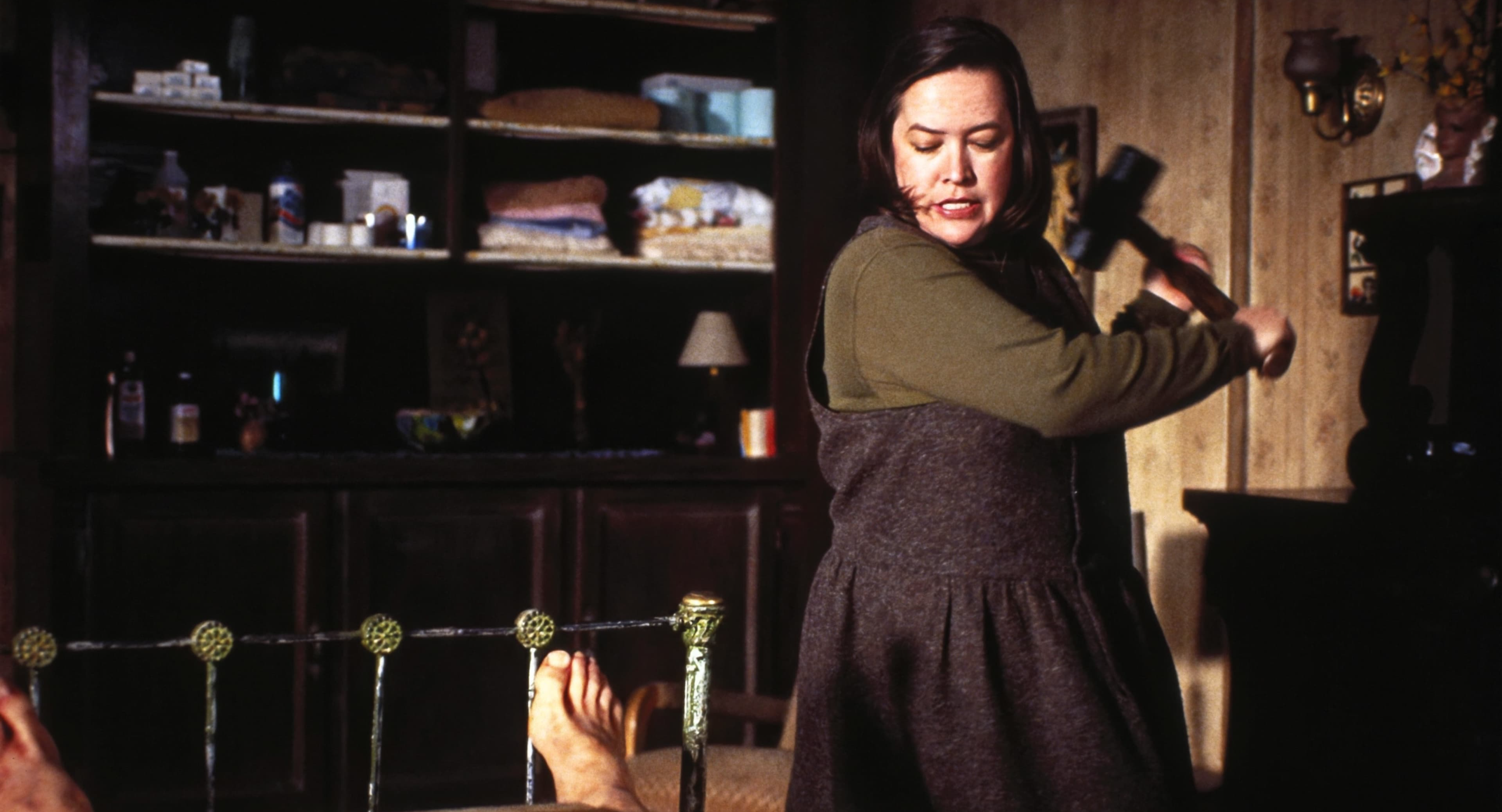Misery – Film Review
Published March 27, 2024

Rob Reiner‘s 1990 psychological horror film, Misery, based on Stephen King’s novel of the same name, stands as a cinematic exemplar of suspense and character-driven terror. Starring James Caan as Paul Sheldon, a successful romance novelist, and Kathy Bates in her Academy Award-winning role as Annie Wilkes, his number one fan, the film intricately explores the terrifying ordeal of a celebrated author held captive by his admirer-turned-tormentor.
Misery begins with Paul Sheldon finishing his latest novel in a secluded Colorado hotel, a personal ritual after completing each of his books. On his return home, he gets caught in a blizzard, leading to a car crash. Rescued by Annie Wilkes, a former nurse who brings him to her remote home, what seems like a stroke of luck swiftly transforms into a harrowing nightmare when Annie’s obsessive tendencies surface after reading his new manuscript and discovering that Paul has killed off her favorite character, Misery Chastain.
The beauty of Misery lies in its simplicity. The film restricts itself primarily to Annie’s house, creating an atmosphere thick with tension, claustrophobia, and unpredictability. This minimalistic approach not only serves the film’s suspense but also magnifies the psychological nuances of the characters. Kathy Bates’s portrayal of Annie is a study in contrasts – her transitions from sweet, caring nurse to violent psychopath are chillingly unpredictable and profoundly unsettling. Meanwhile, James Caan’s performance effectively captures Paul’s increasing terror, desperation, and resourcefulness, offering a riveting counter to Bates’s unhinged dominance.
The film is also a fascinating exploration of fan culture and the creator-audience relationship, turning what is generally considered a positive interaction into a deeply unsettling examination of obsession and entitlement.
Rob Reiner, known for his versatile directorial ventures, excels in translating King’s novel to screen, focusing intently on character development and the evolving dynamics between Sheldon and Wilkes. Reiner’s meticulous attention to pacing ensures that each scene incrementally builds upon the suspense, never allowing the audience a moment of respite or predictability.
The screenplay adaptation by William Goldman deserves applause for its conciseness and for capturing the essence of King’s original work, focusing tightly on the psychological duel between Paul and Annie. Dialogues are crafted with an acute awareness of the characters’ psychological makeup, enriching the narrative with layers of subtext and making every interaction laden with meaning.
The cinematography by Barry Sonnenfeld is remarkably effective in amplifying the film’s claustrophobic atmosphere. The framing and use of close-ups serve to intensify the isolation and captivity Sheldon experiences, while also highlighting the menacing unpredictability of Wilkes’s character.
Marc Shaiman‘s score complements the narrative perfectly, subtly accentuating the tension without overwhelming the scene or manipulating the audience’s emotions unnecessarily.
Misery is an enthralling psychological horror that benefits immensely from superb performances, adept direction, and a tightly woven narrative. Kathy Bates’s portrayal of Annie Wilkes is undoubtedly the highlight, providing a character that remains etched in the annals of horror antagonists. James Caan’s portrayal of Sheldon’s mental and physical anguish offers a compelling juxtaposition to Annie’s calm insanity.
However, the film is not without its criticisms. The lack of deeper exploration into Annie’s background, aside from brief mentions of her past crimes, leaves an intriguing psychological profile only partially examined. Furthermore, while the film’s ending delivers a cathartic resolution, it somewhat succumbs to the typical tropes of the genre, wrapping up in a manner that may seem predictable to some.
Additionally, in focusing so much on the dynamic between Sheldon and Wilkes, Misery misses opportunities to delve into broader themes of solitude, creativity under duress, and the sacrifices artists make for their work, which are only superficially touched upon.
Despite these minor critiques, Misery endures as a masterpiece of psychological horror. It is a testament to the power of storytelling, where character psychology, suspenseful pacing, and masterful acting converge to create an unforgettable cinematic experience. The film not only showcases Stephen King’s narrative strengths but also underlines the formidable talents of Reiner, Bates, and Caan.
